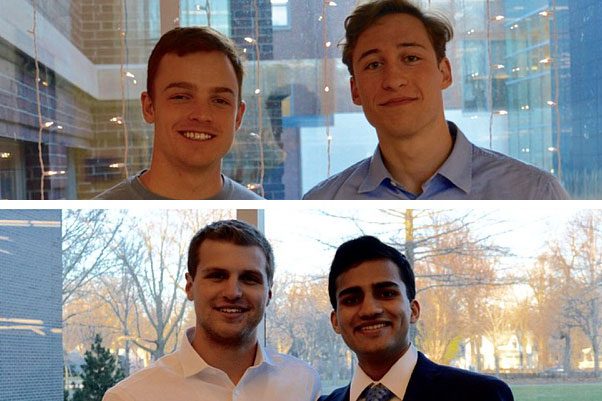Pitch perfect: Student entrepreneurs take top prizes at inaugural Start-Up Fellowship Competition
Locally-sourced ice cream and a student concierge service were big winners, banking $10,000 for two teams.

The only thing Rohan Mukherjee ‘19 enjoys more than talking about ice cream? Eating it, of course.
Whether describing perfect ice crystals or the precise “spoon-ability” of a first scoop from the container, Mukherjee hoped his passion would be a major selling point at Carleton’s Start-Up Fellowship Competition. The Hoboken, N.J. native even told the judges, “Who needs money when you’ve got ice cream?”
Turns out, you can have both.
Thanks to their winning Minnesota Nice Cream proposal, Mukherjee and Beau Smit ’17 (White Bear Lake, MN) were one of two teams that banked $10,000 at the inaugural competition. Jeremy Keane ’17 (New York City) and Mitchell Biewen ’17 (Golden Valley, MN) also earned top honors and $10,000 for Campus Concierge, which delivers customized care packages to college students.
“Students can often be under the impression that if they want to be an entrepreneur, they have to go to business school. But entrepreneurs, more than anything, are problem solvers. They don’t get to choose which parts of the problem they want to work on. They work them all,” says Nathan Grawe, a professor of economics and department chair who constructed the competition.
“That’s a skill that really fits with the Carleton mission. It’s history students taking classes in chemistry. Economics majors taking physics and religion courses. The sum total of all that learning is informing students about different approaches to problems.”
RUNNING WITH AN IDEA
To enter the Start-Up Fellowship Competition, teams of Carls submitted a 10-page proposal with their best ideas. Each team was connected with an alumni mentor before spending the majority of winter term refining proposals.
Overall, nine teams featuring 27 students applied. Everyone was invited to finals in February, where students had five minutes to pitch to judges—Kathy Roland ’80 of Oak Investment Partners and visiting economics professor Bruce Dalgaard—and another five to answer questions.
Funding for the joint winners came from the Dean of Students office, the Raymond Plank Professorship of Incentive Economics, and donations to the Ada M. Harrison Distinguished Teaching Professorship of the Social Sciences.
“It was great to see something like this developed at Carleton. I think a lot of students have been wanting it,” says Biewen, who got his entrepreneurial start with a lawn mowing service in high school. “Carleton students are really good self-learners. They can take an idea and run with it. The competition allows students to take advantage of what they’re already doing.”
READY FOR BUSINESS
With an infusion of capital in hand, Biewen and Keane’s Campus Concierge concept continues to evolve.
Both wanted to test the viability of their idea before pitching it to judges, so Biewen (mathematics/statistics) and Keane (political science) set up an online order form and began delivering late night snacks to Carls. But because Biewen and Keane were the only employees, 2 a.m. deliveries to all parts of campus started to take a toll. Today, their focus is on curating care packages that parents can buy for students without having to shop or ship on their own.
While Biewen and Keane plan to spend summer fine-tuning their plan for a full rollout in fall, Mukherjee and Smit (economics) are hoping to capitalize on ice cream weather with several Minnesota Nice Cream flavors finalized by mid-June. Mukherjee launched a boutique ice cream brand with friends while in high school. Similarly, he and Smit plan to partner with small local stores and co-ops.
PLANTING A SEED
Where both projects end up financially isn’t nearly as important as the fact that they’ve been allowed to start, Grawe says.
The competition is meant to plant a seed. Students get to work with alumni experts and refine business plans, gaining valuable experience along the way. Real money means real potential, but whatever comes next in terms of full-time viability—that’s just the proverbial cherry on top.
“The real benefit is to get students talking to one another,” Grawe says. “Only a couple of teams win prizes, but a good number of teams are still thinking about their ideas and what they might do with them moving forward.”
Thanks and appreciation to alumni who helped with the inaugural Start-Up Fellowship Competition:
* Eric Carlson ‘66, Leavey School of Business and Santa Clara University
* Art Gilliland ‘93, Skyport Systems
* Catherine Hernandez ‘98, Bust Out Solutions
* Ben Kazez ‘08, self-employed
* Luke Lightning ‘93, SVP Partnerships at LAUNCH
* Jeff Lin ‘98, Bust Out Solutions
* Ethan Martin ‘99, PFD Group
* Jake Phillips ‘07, ACES
* Kathryn Roland ‘80, Oak Investment Partners
* Emily Vikre ‘05, Vikre Distillery
* Jim Watkins ‘07, Sociable Cider Werks
* Mike Wiebolt ‘08, Goldman, Sachs & Co.